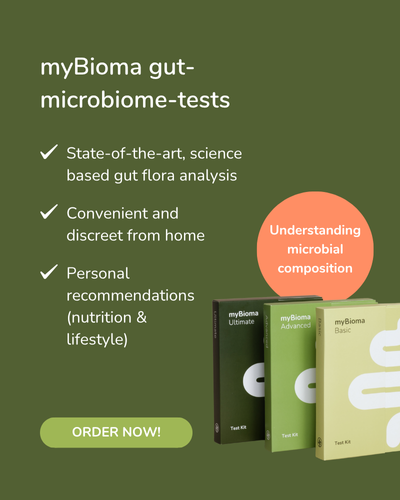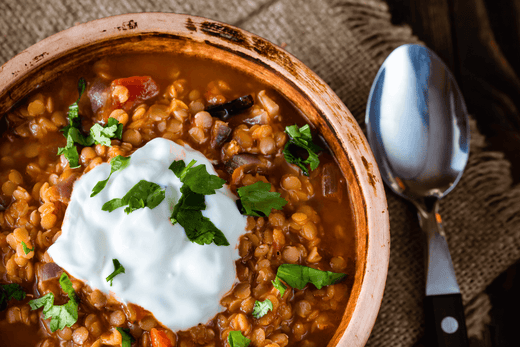Table of contents
- 1. At what point is one considered overweight?
- 2. What makes you fat?
- 3. Can a disturbed gut flora lead to obesity?
- 4. How do gut bacteria make us fat?
- 5. Which gut bacteria make us fat?
- 6. Which intestinal bacteria make you slim?
- 7. What does this do to the body?
- 8. The microbiome diet for losing weight
- 9. Sport does the trick
- 10. Balance
Summer is approaching and the topic of the bikini figure is on our minds again: how can we get rid of those annoying fat pads that have built up on our hips? Could the intestinal flora be to blame for the fact that the kilos just won't come off? And what happens to your gut flora when you're overweight? We show you in 10 steps how your gut bacteria influence your weight and what you can do about it!
1. At what point is one considered overweight?
First of all, we need to clarify how much weight is actually too much. To do this, we use the body mass index (BMI) as a scale. This is calculated from the ratio of body weight to height and is given in kg/m². You can therefore easily calculate your BMI yourself. For example, if you weigh 65 kg and are 1.68 m tall, the calculation is as follows: 65 : (1.68 x 1.68) = 23 kg/m².
A BMI in the range of 18.5 to 25 kg/m² indicates normal weight, underweight and overweight. If the BMI is over 30 kg/m², this is a pathological form of overweight, known as obesity. (1)
2. What makes you fat?
The principle of gaining and losing weight is actually quite simple: if you take in more energy in the form of food than you consume, this excess energy is stored in the form of body fat. Conversely, if you consume less food, your body has to draw on its fat reserves. So two factors play a key role: what you eat and how much energy you expend.
To maintain a normal weight, you should therefore eat a healthy diet and avoid foods with a high calorie value. In addition, your energy consumption increases with exercise and sport and thus promotes fat loss. Conclusion: If you want to lose weight, you need to eat healthier and exercise more. So far, so simple! (1)
3. Can a disturbed gut flora lead to obesity?
There's another factor: your gut bacteria intervene when it comes to your body weight!
How does it work? Let's take a closer look now.
Every person has an individual microbiome - so the composition of your gut bacteria is unique. The microbiome plays a major role in your health and is involved in the development of many diseases, such as diabetes, irritable bowel syndrome and atherosclerosis.
The many intestinal bacteria behave differently. Some bacteria promote your health, others can disrupt it. The same applies to overweight and obesity - there are bacteria that promote obesity as well as those that protect against it. (2)
4. How do gut bacteria make us fat?
Intestinal bacteria help you with digestion. They break down food components that we could not break down on our own and either feed on them themselves or make them available to us. Certain bacteria have specialized in this and therefore can provide us with more energy compared to other bacteria. As a result, your cousin, for example, can get more energy from the same meal than you and is therefore more likely to be overweight. (1)

Your diet determines which bacteria live in your gut. A diet rich in fiber is therefore essential for a healthy microbiome.
5. Which gut bacteria make us fat?
Many studies have shown that the microbiome of overweight people differs significantly from that of people of normal weight. Individual bacterial species such as Actinobacter, Actinomyces, Lactobacillus and Eubacterium appear to be higher in overweight people. In addition, the intestinal flora is less diverse. However, further studies are needed to understand the exact mechanisms of action more precisely.
A high diversity, an intestinal flora with many different types of bacteria, is an indication of a healthy intestine - this also applies to many other diseases. The increased presence of individual bacteria in overweight people could indicate that these bacteria are centrally involved in the development of obesity.
However, at the current state of science, it is still difficult to say which came first: the altered microbiome or the obesity? What is certain, however, is that people with an "overweight microbiome" gain weight more easily and probably also have greater difficulty losing weight. That's why we at myBioma test your microbiome and show you how your gut bacteria are doing. (2, 3, 4, 5)
Lactobacilli are a component of many probiotics. The question here is justified:
Can you gain weight from probiotics?
First of all, it must be emphasized that there are many different probiotics with a wide variety of compositions and bacteria. It is therefore not possible to make statements for all probiotics.
The study situation here is not clear, but it is clear that taking probiotics alone does not normally lead to a significant change in weight. It is therefore more likely that no weight will be gained, but also that no weight will be lost.
It has also been observed that probiotics containing only a few different bacteria are more likely to have an effect on weight. It is therefore better to use preparations with many different bacterial strains. (9)
6. Which intestinal bacteria make you slim?
It is easier to recognize a healthy microbiome than to define a "fat" microbiome.The microbiome has a particularly diverse structure and consists of many different bacteria.This not only appears to protect against obesity, but also makes the gut more resistant to stress factors.
It is also noticeable that certain bacteria are more prevalent in people of normal weight compared to overweight people. For example, healthy people have a higher proportion of Bacterioidetes - these are absent in overweight people, but they have more Firmicutes. Other bacteria such as Akkermansia muciniphila, Alstipes, Methanobrevibacter smithii and Faecalibacterium prausnitzii also appear to protect against obesity.(2, 5, 6, 7)
7. What does this do to the body?
However, the typical microbiome of overweight people not only leads to obesity and its consequences, but also affects the rest of the body. The same microbiome constellations that make us fat also promote inflammation, activate the immune system to a hyperactive state and worsen the body's sugar tolerance.This promotes diseases such as diabetes, fatty liver, high blood pressure, atherosclerosis and, as a result, cardiovascular disease.(2)
From this we can conclude that obesity and the diseases associated with it are closely linked to the microbiome and that part of the problem may lie in the gut.This is precisely why it is incredibly important to maintain a normal weight and eat as healthily as possible - this is the only way to keep your gut bacteria and you fit!

It doesn't just have to be salad to lose weight! A balanced diet with lots of colorful vegetables makes sense.
8. The microbiome diet for losing weight
A healthy diet is essential for you and your microbiome to do well! This includes plenty of fiber from whole grain products, vegetables and fruit, healthy fats and a balanced intake of protein and carbohydrates. However, dietary fiber is particularly important for a healthy microbiome!
You can find more tips on how to eat healthily for yourself and your microbiome in our article "The microbiome diet". First things first: if you are planning to change your diet, be patient with yourself and your gut bacteria. Your gut has to get used to it first and it can take some time for your microbiome to transform into a healthy state. So take heart if good results take time - this is completely normal! (8)
9. Sport does the trick
Don't forget to get enough exercise and sport! The more you move, the more energy you use and the more your body uses your fat reserves. Endurance training, such as running, swimming and cycling, is particularly helpful, but strength training also boosts your muscles. In our blog article "Sport - 8 tricks for better health", we have summarized helpful tips on how you can integrate more sport into your everyday life.
10. Balance
Last but not least, you should never forget how important balance is for your body. So make sure you have a good balance in your life! Treat yourself to short breaks between periods of stress at work, try relaxation exercises such as yoga and don't be too hard on yourself. This is the only way to lead a healthy lifestyle!

Cycling is a wonderful endurance workout and helps with fat loss.
References
- Haslam DW, James WP. Obesity. Lancet .2005; 366 (9492): 1197–209.
- Turnbaugh PJ, Hamady M, Yatsunenko T, et al. A core gut microbiome in obese and lean twins. Nature. 2009;457(7228):480-4.
- Mayengbam, S. et al. Impact of dietary fiber supplementation on modulating microbiota-host-metabolic axes in obesity. J Nutritional Biochem (2018). doi:10.1016/j.jnutbio.2018.11.003
- Tims, S. et al. Microbiota conservation and BMI signatures in adult monozygotic twins. Isme J 7, 707 (2013).
- Million, M. et al. Obesity-associated gut microbiota is enriched in Lactobacillus reuteri and depleted in Bifidobacterium animalis and Methanobrevibacter smithii. Int J Obesity 36, 817 (2011).
- Forslund, K. et al. Disentangling type 2 diabetes and metformin treatment signatures in the human gut microbiota. Nature 528, 262 (2015).
- Zhernakova, A. et al. Population-based metagenomics analysis reveals markers for gut microbiome composition and diversity. Science 352, 565–569 (2016).
- Zmora N, Suez J, Elinav E. You are what you eat: diet, health and the gut microbiota. Nat Rev Gastroenterol Hepatol. 2018;16(1):35-56.
- https://www.zentrum-der-gesundheit.de/ernaehrung/nahrungsergaenzung/probiotika-uebersicht/probiotika-nebenwirkungen









